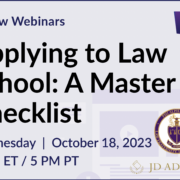When to Take the LSAT — JD Advising
 The Law School Admission Test (LSAT) is offered four times a year: February, June, October (sometimes late September), and December. Keep in mind that although people spread rumors about one particular LSAT administration being easier or harder than others, no one LSAT administration is consistently easier or harder. So do not base when you take the LSAT on rumors about the test!
The Law School Admission Test (LSAT) is offered four times a year: February, June, October (sometimes late September), and December. Keep in mind that although people spread rumors about one particular LSAT administration being easier or harder than others, no one LSAT administration is consistently easier or harder. So do not base when you take the LSAT on rumors about the test!
In terms of timing, however, there are advantages and disadvantages to taking each LSAT. Below, we talk about the advantages and disadvantages of each LSAT as well as some personal factors to consider as well.
When To Take the LSAT – Advantages and Disadvantages of Each Test Date:
The June LSAT:
If you take the June LSAT, you will have the advantage of submitting your applications right at the beginning of the law school admission period. This can be beneficial if you apply to schools that use a “rolling admissions” process (that is, a process where schools accept students as they receive their applications). It can also be nice to have extra time to work on your applications. Further, taking the June LSAT gives you the option of retaking the exam in October (…and December, and perhaps February for some schools!), should you not receive as high of a score as you would like – although ideally, it is best to take the LSAT only once if possible.
Another thing to note about the June LSAT is that it is offered on a Monday in the afternoon (12:30 PM) rather than all of the other LSAT’s (which are offered on Saturday mornings). This could be an advantage or disadvantage for you, depending on when you work best!
The October LSAT:
The October LSAT is popular because it is at the end of the summer so students can use all summer to study. So this will be advantageous for you if the summer is the best time to put in the hours studying for the LSAT.
Another advantage of taking the October LSAT is that you have the option of taking the December LSAT should you not receive as high of a score as you want on the October one.
As mentioned above, the October, December, and February LSATs are also good for students who are better at taking tests in the morning (rather than in the afternoon, as it is offered for the June LSAT).
The December LSAT:
The December LSAT is the last exam that you can take to meet the deadlines of being admitted to all law schools law school the following year. There are two downsides to taking this exam: First, you will not be able to retake the LSAT if you receive a score you do not like (unless you plan on waiting another year to apply to law school or unless you plan on applying to a law school that accept LSAT scores post-February LSAT); Second, you will be at a disadvantage for law schools that accept students utilizing a “rolling admissions” policy.
The December LSAT does not tend to be that convenient for students either, since it usually given around the time you may have final exams. Further, the holidays sometimes complicate study plans for students. However, taking the December LSAT is definitely an option for students looking to attend law school the following yaer.
The February LSAT:
This test is a little late to apply to some law schools. However, some law schools accept scores from the February administration. It is becoming more popular for schools to do so. If something catastrophic happened during the December LSAT or if you truly feel the December LSAT did not reflect your true abilities, then the February LSAT is definitely an option so long as the schools you are applying to accept the score. Just as with the December LSAT, if you are applying to law schools the same year you take the February LSAT you will lose any advantage with schools that admit students on a rolling admissions basis.
For these reasons, the February LSAT is not recommended for as a first-choice option for students who want to go to law school the same year. However, the February LSAT is a wonderful option for students looking to get the LSAT over with early who are applying to go to law school the following year.
When to Take the LSAT – Personal Factors to Consider:
If you are deciding which LSAT to take, consider the following:
- Do you have a busy school schedule? If so, an LSAT that falls over or at the very end of the school year (i.e. June or December) may not be ideal. If you have a lighter class load, though, it is worth it to consider taking the LSAT.
- Are you disciplined to start studying early? If you are disciplined to start studying early and “spread out” your studying then the obligations you have directly prior to the LSAT will not matter as much as if you are not super-disciplined and know that you will only start studying 8-12 weeks ahead of the LSAT.
- When are your law school application deadlines? Many law schools have later application dates than they used to (that is, some will accept February LSAT scores!). Remember that even if your law school allows later admissions, it can still be a disadvantage to, however, if the law schools you are applying to use rolling admissions (and many of them do).
Our Recommendation on When to Take the LSAT:
- We recommend you take the one that fits best with your schedule and when you will have the time to best prepare for the LSAT. (This ends up being the October LSAT for many, who take advantage of the summer to study).
- Another idea that we love is the idea of taking the LSAT in February and being an “early bird.” This gives you extra time to work on your application and eases anxiety once you have a good LSAT score locked in. You also have the option to retake it in June should you have to. Further, for people in states with bad winters, winter is sometimes the perfect time to study (so you can enjoy your spring and summer!) However, again, if February is super-unrealistic with your personal schedule then we recommend taking an LSAT that is more suited to you.
When to take the LSAT is an individual decision that has to be made using all of the factors above.
Pursuing Law School? We’ve Got You Covered!
🌟 Special Offer: Enroll in our FREE on-demand law school prep course, meticulously crafted by a top-ranked law student. Secure your spot now





Trackbacks & Pingbacks
[…] The Law School Admissions Test (LSAT) is administered four times per year – in June, September (or October), December, and February. Each test is equally difficult. There is no general “best” time to take the LSAT. The best time to take it is whenever you have enough time to adequately prepare for it. For a detailed overview of the tests as well as other factors to consider, please see this post on when to take the LSAT. […]
[…] “retake LSAT” will be prior to the year you are applying, this concern is diminished. (Read this post to see the advantages and disadvantages for taking the LSAT on particular test […]
[…] When to take the LSAT — which test is right for you? What is the latest test you can take and still apply to law school on time? […]
Comments are closed.